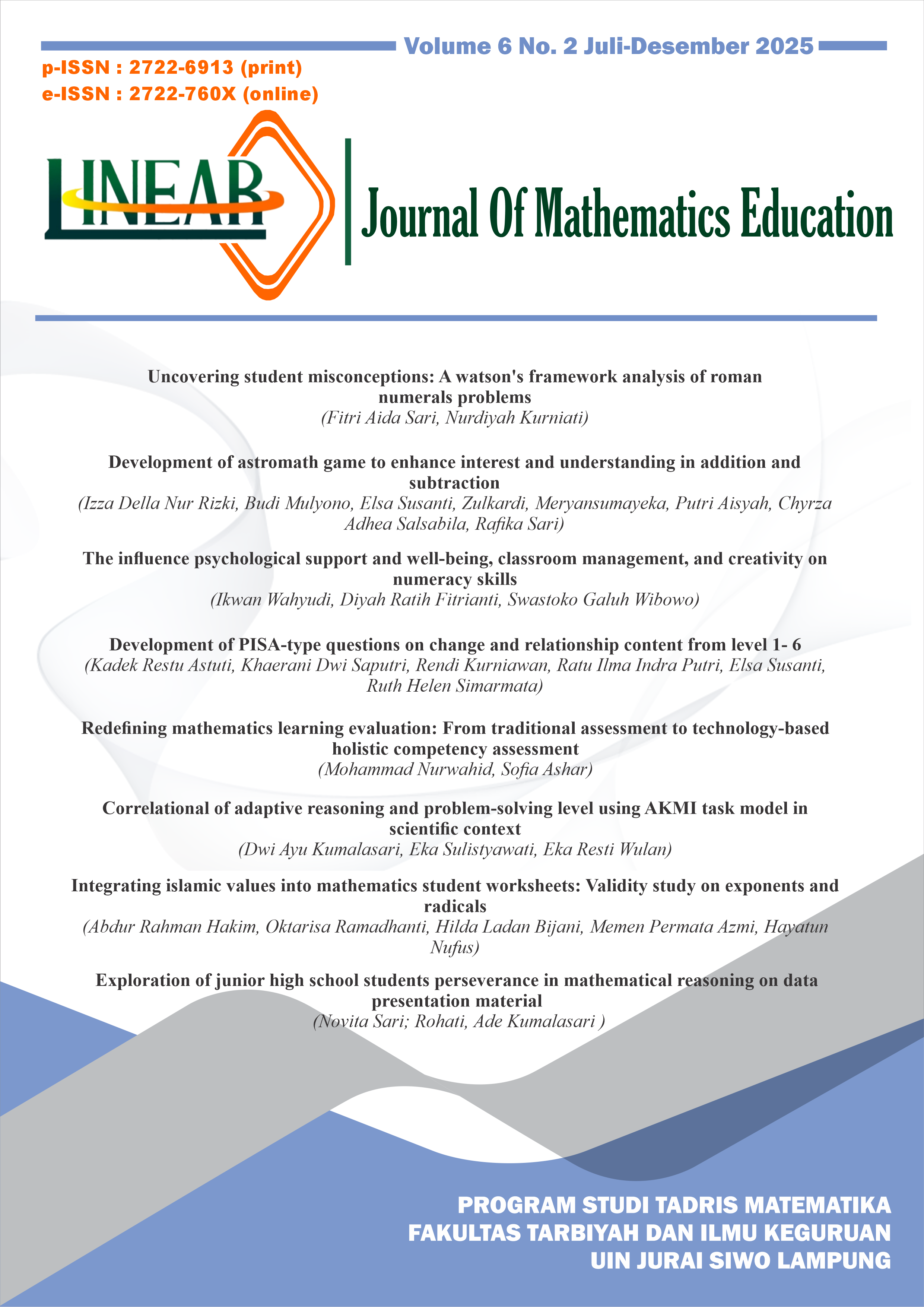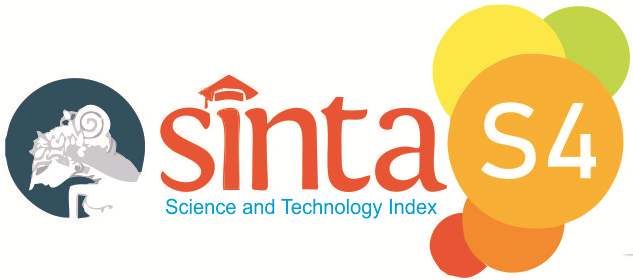Exploration of junior high school students perseverance in mathematical reasoning on data presentation material
DOI:
https://doi.org/10.32332/cgqbdp65Keywords:
Data Presentation, Perseverance in Mathematical ReasoningAbstract
This qualitative study explores Perseverance in Mathematical Reasoning (PiMR) in a junior high school student while solving a Data Presentation problem. A qualitative approach was chosen to gain an in-depth and contextual understanding of the subject's reasoning process and behaviors. The background for this study is the low level of mathematical reasoning perseverance among Indonesian students, which is a crucial ability. This study used a PISA-model written test and an interview with one seventh-grade subject. Data were analyzed using the Miles and Huberman model through data reduction, data display, and conclusion drawing. In general, the subject successfully demonstrated some indicators of PiMR, such as exploring solutions and attempting to correct answers. However, the main finding reveals the subject's inability to adjust strategies when facing an impasse, which resulted in the final answer remaining incorrect. The implication of this research emphasizes the need for targeted educational support to develop mathematical reasoning perseverance in students that is not only persistent but also more adaptive and sustainable.
References
Asdarina, O., & Ridha, D. M. (2020). Analisis Kemampuan Penalaran Matematis Siswa Dalam Menyelesaikan Soal Setara Pisa Konten Geometri. Jurnal Numeracy, 7(2). https://doi.org/(10.46244/numeracy.v7i2.1167)
Barnes, A. (2019). Perseverance in mathematical reasoning: the role of children’s conative focus in the productive interplay between cognition and affect. Research in Mathematics Education, 21(3), 271–294. https://doi.org/10.1080/14794802.2019.1590229
Barnes, A. (2021). Enjoyment in learning mathematics: its role as a potential barrier to children’s perseverance in mathematical reasoning. Educational Studies in Mathematics, 106(1), 45–63. https://doi.org/10.1007/s10649-020-09992-x
Chusna, C. A., Rochmad, & Prasetyo, A. P. B. (2019). Mathematical Resilience Siswa pada Pembelajaran Team Assisted Individualization dalam Upaya Meningkatkan Kemampuan Penalaran Matematika. https://doi.org/10.15294/ujme.v8i1.29905
Goswami, U. (2015). CPRT Research Survey 3 (new series) CHILDREN’S COGNITIVE DEVELOPMENT AND LEARNING. www.cprtrust.org.uk.
Irawan, H., Fajar, C. R., & Wahyuni, R. (2025). Klasifikasi Kemampuan Penalaran Matematis Pada Materi Penyajian Data Dan Diagram: Profil Siswa Kelas VII. https://doi.org/10.18592/jpm.vi.17319
Mason, J., Burton, L., & Stacey, K. (2010). Thinking Mathematically, Second Edition. www.pearsoned.co.uk
Muhaajir, A. A., Faif Pasani, C., & Hidayanto, T. (2024). Pengembangan Modul Ajar Berbasis Pemecahan Masalah Pada Materi Penyajian Data Di Kelas VII SMP. In Prosiding Seminar Nasional Pendidikan Matematika (SENPIKA) (Vol. 2). http://prosiding.senpika.ulm.ac.id/index.php/senpika
Muhsana, N., & Diana, H. A. (2022). PENGARUH KECEMASAN MATEMATIKA TERHADAP KEMAMPUAN PENALARAN MATEMATIS BERBASIS SOAL PISA. Jurnal Pendidikan Matematika Universitas Lampung, 10(1), 41–52. https://doi.org/10.23960/mtk/v10i1.pp41-52
Opinsi, D., & Kurniah, N. (2022). Penerapan Realistics Mathematics Education (RME) Untuk Meningkatkan Ketekunan Dan Prestasi Belajar Siswa. DIADIK: Jurnal Ilmiah Teknologi Pendidikan, 12(1), 2022. https://doi.org/10.33369/diadik.v12i1.21347
Özcan, Z. Ç. (2016). The relationship between mathematical problem-solving skills and self-regulated learning through homework behaviours, motivation, and metacognition. International Journal of Mathematical Education in Science and Technology, 47(3), 408–420. https://doi.org/10.1080/0020739X.2015.1080313
Ramadanti, F., Mutaqin, A., & Hendrayana, A. (2021). Pengembangan E-Modul Matematika Berbasis PBL (Problem Based Learning) pada Materi Penyajian Data untuk Siswa SMP. 05(03), 2733–2745. https://doi.org//10.31004/cendekia.v5i3.759
Rasyid, A. N., Rohati, R., & Kumalasari, A. (2025). Analisis Perseverance in Mathematical Reasoning (PiMR) Siswa dengan Tipe AQ Camper pada Materi Persamaan Linear Satu Variabel (PLSV). Kognitif: Jurnal Riset HOTS Pendidikan Matematika, 5(2), 923–934. https://doi.org/10.51574/kognitif.v5i2.3088
Rohati, R., Kusumah, Y. S., & Kusnandi, K. (2022). The development of analytical rubrics: An avenue to assess students’ mathematical reasoning behavior. Cypriot Journal of Educational Sciences, 17(8), 2553–2566. https://doi.org/10.18844/cjes.v17i8.7043
Romsih, O., Yuhana, Y., & Nindiasari, H. (2019). Peningkatan Kemampuan Penalaran Matematis Siswa Melalui Problem Posing Ditinjau Dari Tahap Perkembangan Kognitif Siswa. SJME (Supremum Journal of Mathematics Education), 3(1), 37–46. https://doi.org/https://repository.untirta.ac.id/4664/
Sabri, I. S., & Salim. (2024). Analysis of Mathematical Reasoning Abilities Based on PISA Number Content. 5(1), 60–74. https://doi.org/10.36709/japend.v5i1.125
Santana, H. H., Sunarso, A., & Mariani, S. (2022). Analisis Kemampuan Penalaran dalam Soal Pemecahan Masalah Matematika Ditinjau dari Self-Confidence melalui Model Pembelajaran Discovery Learning. Jurnal Basicedu, 6(5), 7879–7887. https://doi.org/10.31004/basicedu.v6i5.3643
Taufik, & Komar, N. (2021). Hubungan Self Efficacy Terhadap Peningkatan Motivasi Belajar Dan Hasil Belajar Matematika Siswa Di Sekolah. Andragogi: Jurnal Pendidikan Islam Dan Manajemen Pendidikan Islam, 1(3), 418–440. https://doi.org/10.36671/andragogi.v1i3.66
Williams, G. (2014). Optimistic problem-solving activity: enacting confidence, persistence, and perseverance. ZDM - International Journal on Mathematics Education, 46(3), 407–422. https://doi.org/10.1007/s11858-014-0586-y
Wirawan, N., Yuhana, Y., & Fatah, A. (2023). Analisis Kemampuan Penalaran Matematis Bentuk Literasi Numerasi AKM pada Konten Bilangan Ditinjau dari Disposisi Matematis. Jurnal Cendekia : Jurnal Pendidikan Matematika, 7(3). https://doi.org/10.31004/cendekia.v7i3.2623
Downloads
Published
Issue
Section
License
Copyright (c) 2025 Novita Sari; Rohati, Ade Kumalasari

This work is licensed under a Creative Commons Attribution-ShareAlike 4.0 International License.

















